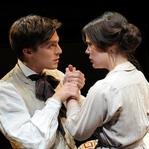SITE GUIDE
SEARCH
REVIEWS
REVIEW ARCHIVES
ADVERTISING AT CURTAINUP
FEATURES
NEWS
Etcetera and
Short Term Listings
LISTINGS
Broadway
Off-Broadway
NYC Restaurants
BOOKS and CDs
OTHER PLACES
Berkshires
London
California
New Jersey
DC
Connecticut
Philadelphia
Elsewhere
QUOTES
TKTS
PLAYWRIGHTS' ALBUMS
LETTERS TO EDITOR
FILM
LINKS
MISCELLANEOUS
Free Updates
Masthead
Writing for Us
A CurtainUp  London Review
London Review
 London Review
London ReviewMary Broome
|
She's simple. I'm ironical. — Leonard
|

Jack Farthing as Leonard and Katie McGuinness as Mary (Photo: Robert Day) |
Monkhouse was a part of the Manchester playwrights. They included Harold Brighouse known for Hobson's Choice and Stanley Houghton, whose plays were put on by Miss Annie Horniman, the daughter of the tea magnate, at her repertory theatre, The Gaiety in Rusholme, Manchester.
In this play, Leonard's father Edward Timbrell (Michael Lumsden) is economically typical of the affluent mill owners who were the making of commerce in the northern capital Manchester. Where Edward Timbrell differs from the norm is in offering his son Leonard £300 a year to marry housemaid Mary. Pregnant maidservants were not uncommon, many gave birth in secret attributing their growth in size to the dropsy, the babies were left to die or farmed out to be cared for in often less than adequate homes. Others, the lucky ones, would marry a lower class man who would be paid an incentive to relieve the employing family of embarrassment but rarely did the father of the child, even if he were unmarried, marry the maid.
The character of Leonard, sporting a large artistic bow instead of a necktie harks back to the Wildean naughty nineties and we first meet him in the planning of the wedding of his more conventional brother Edgar (Paul O'Mahony) to Sheila Ray (Emily Pennant-Rea). There is talk of the wedding being spoilt by Leonard's threatening to wear a morning coat instead of the more formal frock coat.
Leonard is flippant and arrogant and when it is revealed that Mary is pregnant, we get the impression that the father's stipulation that Leonard should marry her is meant as a punishment for his spoilt son. We may laugh at Leonard's archness and outrageous digs at his family but underneath the humour there is no doubt that this young man is a snake and we despise his morality or lack of it. Fortunately with their income reduced by Leonard's further excesses and a tragedy, Mary stands up to the family and makes her own future.
The performances are good. Katie McGuinness is a very pretty Mary Broome who blinks in shy disbelief as she is propelled centre stage in the family she serves. More used to invisibility, she stands nervously clutching at and twisting her apron. Her in laws are mostly disdainful as she makes the social gaffes she hasn't been brought up to avoid although I thought the portrayal of her own parents was a little too refined but at least they avoid caricature.
Jack Farthing as Leonard is shallow and selfish making it hard to sympathise with any philosophical belief in freedom or modernity which might underlie his behaviour. Michael Lumsden as Edward Timbrell has the solidity of a man used to being obeyed. His downtrodden wife played by Eunice Roberts has a past hinted at that may be less affluent than her husband as the son plays on this unspoken suggestion and tries to incite his mother to rebel. "You dare to suggest your mother is no better than your wife!" sums up Mr Timbrell's indignation and lack of sympathy.
The Orange Tree period plays are always beautifully dressed with fine lace and authentic fashion of the era and small pieces of good furniture add detail. Scene changes are carried out by a choreographed ritual of servants folding up table cloths or moving furniture which, although long winded, sets the scene. The director moves the cast too little in this small square venue so that we get to see too much of the backs of the actors.
In 1911 the Suffragette movement is under way and building in strength; many of their meetings were at Manchester's Free Trade Hall and we can feel this influence in Monkhouse's play. Mary Broome might have had more balance if Leonard Timbrell had been a more sympathetic character or at least one or two redeeming features and whilst we can sympathise with his father's predicament as to what to do with his wayward son, we cannot ally ourselves with the father's disregard for the women in his family.
|
Subscribe to our FREE email updates with a note from editor Elyse Sommer about additions to the website -- with main page hot links to the latest features posted at our numerous locations. To subscribe,
E-mail: esommer@curtainup.comesommer@curtainup.com
put SUBSCRIBE CURTAINUP EMAIL UPDATE in the subject line and your full name and email address in the body of the message -- if you can spare a minute, tell us how you came to CurtainUp and from what part of the country. |
| Mary Broome
Written by Allan Monkhouse Directed by Auriol Smith Starring: Jack Farthing, Katie McGuinness, Michael Lumsden With: Emily Pennant-Rea, Martha Dancy, Paul O'Mahany, Eunice Roberts, Charlotte Brimble, Emma Johnston, Bernard Holley, Harriet Eastcott, Eve Shickle, Kieron Jecchinis, Moir Leslie Set Design: Sam Dowson Costume Design: Jude Stenham Lighting: John Harris Running time: Two hours and 15 minutes including an interval Box Office: 020 8940 3633 Booking to 23rd April 2011 Reviewed by Lizzie Loveridge based on 18th March 2011 performance at the Orange Tree Theatre, 1 Clarence Street, Richmond TW9 2SA (Rail/Tube: Richmond) |
|
REVIEW FEEDBACK Highlight one of the responses below and click "copy" or"CTRL+C"
Paste the highlighted text into the subject line (CTRL+ V): Feel free to add detailed comments in the body of the email . . . also the names and emails of any friends to whom you'd like us to forward a copy of this review. |




